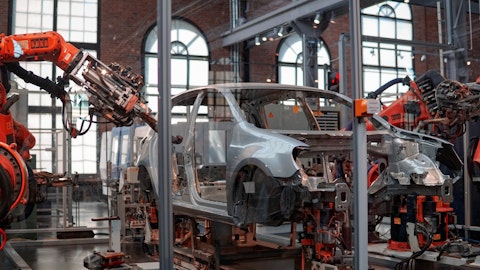Joe Lower: Let me — yes, Joe. Let just add a, kind of, boring finance answer to some of this. Because strategically, Michael, I think very clear in particular as to what we’re trying to do. When you match that with the financial or capital strategy, we have a first-class problem. We have robust cash flow on a very strong balance sheet. So then the question is how do we utilize that and maximize the benefit of it? And it’s not surprising to most it’s an IRR-driven approach and we look at what the return is on each opportunity. We have obviously, as Mike mentioned in the recent past viewed share repurchase as an extremely attractive opportunity. As we look forward, we have found some opportunities that offered very, very compelling returns.
And as we think about capital going forward, we will deploy it in a similar fashion in identifying where there really is truly incremental value. And I think you were going to ask about the finance business and I think we’ve been very clear that one, we’re going to be delivering this growth and we will utilize facilities that we are not funding all of that directly from our balance sheet. As is typical in some ways similar to the way you think about floor plan. So we’re not going to be putting dollar for dollar behind the capital business at the expense of other opportunities.
Mike Manley: And let me just follow-up on that. So I think, Joe, in the past, John, last year, when we think about CID, was clear that we are going to grow that business. That business has been around 35-years and has been successful during that period. And our intention is to grow that business at a speed that we believe is very manageable on pace with the growth of our AN USA businesses predominantly. We have good relationships in our franchise businesses with our OEM captives and that will continue. So we really wanted to focus on the work of AN USA, so it’s going to grow slowly. And it will grow deliberately and it will grow in a way that we think is manageable. RepairSmith is a phenomenal start up business. It’s a much younger business and full of dynamic people really trying to forge a new way of trying to provide convenience and great service to their customers.
But they are there, they’re a start-up business. They’ve grown well, I think they’ve been very deliberate in terms of their growth. But there’s a lot of things that need to continue to happen to make that business grow to scale. So again, don’t expect RepairSmith in the course of the next two, three, four quarters to start to become a dominant force is about a deliberate, progressive approach to growing our business in ways that we think will deliver over time a really good balance result.
John Murphy: Mike, just real quick to follow-up. It’s fair to say that these are good incremental opportunities that are not going to be very material calls on capital that would crowd out share buybacks that have been a big part of the story and there’s probably room for everything. Is that a fair way to think about this?
Mike Manley: Actually, I think that’s more eloquent way than I could have put it. So thank you for your answer.
John Murphy: Okay, then thank you very much guys.
Mike Manley: Thank you, John.
Operator: Thank you. Your next question comes from the line of Daniel Imbro with Stephens. Your line is open.





